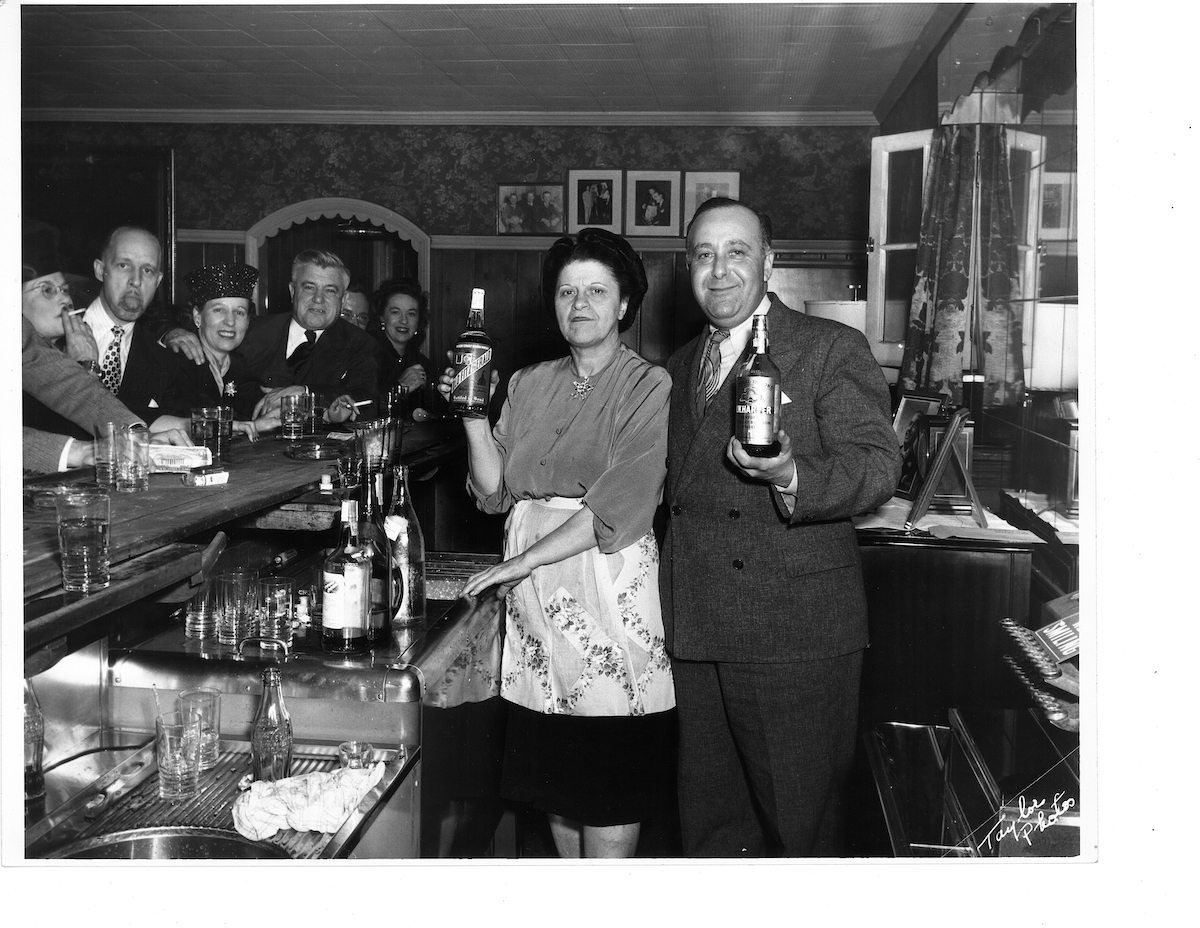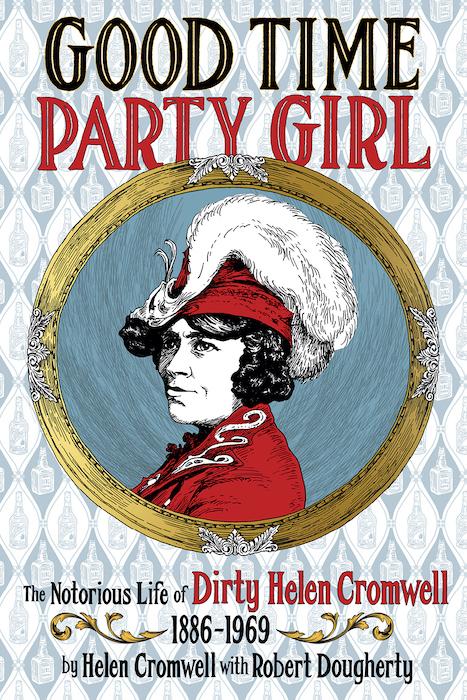
Helen behind the bar at the Sunflower Inn.
THE QUESTION took me by surprise, and I really didn’t know how to answer him. Jesus God, I thought, let me think of some bright, witty reply. Quickly I ran my fingers up the big, white plume and adjusted the headache band—anything to delay my answering for a few moments. “What did you say, Al?” I inquired, knowing full well what Al Capone had asked.
“I said I’ve had you checked, and why does a girl of your background like this sort of life?” He extended his hand, holding the black cigar, and waved it at the room of throbbing dancers weaving back and forth to the mournful, moody music of King Oliver’s Storyville band. Then he turned his face toward mine and stared at me with his big, piercing brown eyes. The scar on his cheek stood out vividly in the low lighting, and his wide mouth curled. I reached under the table and gently pushed Johnny Torrio’s leg away from mine. No good answer could come.
“Because I’m different, Al,” I finally said.
I’m different—and probably unfashionable—when compared with all the other whores and madams who attempt to make a story out of their past shenanigans. I’m different for three reasons: I’ve never been poor; I had a good education; I’ve enjoyed my profession to the hilt, and … you know what I mean!
New York City, 1920
BAA-ROOM, BOOM boom boom, baa-room boom boom boom— damn, how I loved the tango! The tango is sort of like a savings and loan institution: the more you put into it, the more you get out of it. The only thing I liked better than the tango was a rich man. I had both the tango and a rich man tied up in a neat package and sealed with a diamond clip, an aquamarine bracelet, and a matching dinner ring.
It started innocently, but many interesting things do start innocently. It was almost six o’clock, the closing hour at Renard’s. Mr. Gold, my boss, was shuffling around in the stock room, and I was tidying up the merchandise in the show cases when the door opened, and a tall gentleman in a Stetson hat entered. He was grubby-faced and obviously intoxicated … but also obviously rich. Money, like great heart, always shows through.
“Howdy, miss!” His voice made a sliding glass door of the glove case rattle.
“Good evening, sir,” I returned in the voice I reserved for drunk business tycoons. “May I help you?”
“That would be nice,” he slobbered in his Texas drawl. “That sure would be nice.” He stared down at the gloves in the glass case. “I want a pair of those gloves—those right there.” He pointed at a stack of ladies’ full-length, white kid opera gloves.
“What size, sir?”
“Well, now, let’s see. Let’s see.” He swept his eyes down my figure, stopping them here and there, then back up again. “Your size, yessiree, just your size.”
I found a pair of eighteen-dollar gloves that fit me perfectly, and he said they’d do nicely. I asked him if he wanted them gift-wrapped, and he allowed as how he did. He had to hold onto the counter to keep from falling, but his eyes were certainly alert to my every movement as I tied a white satin bow around the long glove box. I handed him the box, and he paid me. Then he handed me the box back and said it was a little gift just for me. Drunk or not, I knew I had a “live one.”
He had seen me, he claimed, through the window and had decided I was “just his type.” He gave me his name (I’ll call him Tex) and asked if I would join him for dinner in his suite at the Murray Hill Hotel. I thought about it (for a second) and said, “yes.”
Tex was a mess, as were his apartment at the Murray Hill and his private railroad car (we went there later). Both the apartment and the railroad car were strewn with newspapers and empty whiskey bottles. He was, incidentally, the president of one of the West’s great railroads. He wanted me to spend the weekend with him, and I named my price; he said he’d double it, which was all right with me since I’ve never been one for messy men or messy private railroad cars. Tex was too drunk to cause me much activity or trouble, but I was glad when the weekend was over. Just as I was preparing to leave the Murray Hill on Monday morning, Tex sobered up enough to offer another invitation. “Wanna go to Argentina with me, Helen?”
“Go to Argentina? What are you talking about?”
“I’m gonna go down there and forget everything. Wanna go?” Argentina! The Argentine! The Tango!
“When are you going?” I asked.
“Soon as I can get tickets. Or whatever it is you get.”
“I don’t want to get stuck down there.” I thought quickly and said, “If you’ll pay my expenses, buy me a new wardrobe, and give me a thousand dollars I’ll go.”
“Okay.” We sailed the following Thursday. Tex was still drunk, and it took two stewards to get him into his bed, where he remained during the entire voyage. I had taken Tex’s thousand dollars to the bank and had the teller give me a single one-thousand-dollar bill, which I folded neatly and placed in my shoe. This was to be my “mad money” for getting home.
Eons later, we arrived in Buenos Aires. By this time, I was not speaking to Tex; he had been a perfectly stupid and intoxicated boor the entire voyage. As far as I was concerned, he could have taken all his trains and done you-know-what with them. Immediately upon docking, I discarded Tex and made my way directly to the American Embassy. I told them there exactly what had happened. I told it straightforward: I had been duped by the president of the Railroad into accompanying him to Argentina; he had misrepresented his intentions; he was an alcoholic; I was an American citizen stranded in the Argentine, and I expected the Embassy to see that I was booked for passage on the first nice ship leaving for New York. Also, I told them I was broke (that thousand-dollar bill had practically worn a blister under my big toe).
The Under Secretary had passed me to the Secretary and soon after lunch (he was a true gentleman and asked me to lunch with him right there in the Embassy) he made some calls and informed me that everything was smoothed out and that passage had been booked for me on a ship that was sailing in two days. I told him that he was a dear as were all his “Under people,” and it did my heart good, as an American, to know that my own government took such nice care of its own citizens when they were in distress. He giggled embarrassedly and said it was really nothing, and he only wished that the passage could have been first class rather than cabin.
“Cabin!” I cried. “I’m sorry, Mr. Secretary, but I cannot go cabin class.” I shuddered visibly.
“But my dear,” he said, “You must realize that this is truly an unusual situation for us to afford cabin class. Many times people are sent home by steerage.”
“Steerage!” I screamed, practically dropping the eagle- crested spoon in the clear consomme. “I insist on first-class or nothing.” He said that such a request would have to be taken up with the Ambassador, and I insisted on seeing Ambassador. He was really the nicest one employed there. We were still discussing my predicament at the closing hour, and the Ambassador suggested that we continue our conversation over cocktails at an interesting little off-the-beaten-track bistro he knew of. We were driven there in a car with an American flag on each front fender and two perfectly cute marines in the front seat.
We had dinner at a very smart apartment, which he kept to “get away from official duties.” Since my luggage was still at the dock, and I had made no hotel arrangements, the Ambassador said I was free to stay at his apartment until my ship sailed. And he told me that, of course, I would be sailing first class. After dinner, we went to a rather wild type of frenzied nightclub where the gauchos danced the tango. I wanted to dance it, too, but then he didn’t know how; I couldn’t believe anyone could be much of a diplomat without knowing how to dance the tango! I pouted (just a little), and he asked one of the gauchos to give it a whirl with me— and hot damn!—it was worth the whole hectic trip.

*This excerpt from Good Time Party Girl — The Notorious Life of Dirty Helen Cromwell, 1886-1969 by Helen Cromwell, provided courtesy of Feral House.
About The Book:
This long-lost autobiography of a woman who lived life with no regrets from the 1880s to the 1960s offers a rare look into the colorful criminal underworld from New York to San Francisco and every whorehouse, tavern, and mining camp in between. Demure, sweet, and wild teenage Helen flees from small-town Indiana to Cincinnati with the first of six husbands. She soon realizes that the traditional role of wife and mother isn’t for her. She meets cunning millionaires, bank robbers, detectives, and gangsters as she hustles her way through life. Her friends were everyone else’s enemies—Al Capone, Big Jim Colosimo, and Johnny Torrio all spend time with Helen as she bounces from adventure to adventure.
It’s the true-life story of a woman who never said “No” and carved out an independent life that transgressed every societal boundary. Assisted by Robert Dougherty, ‘Dirty Helen’ was first published in 1966.








